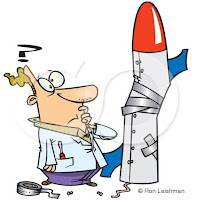 One thing I have learned in my short time in the field of engineering is that all successful engineers and innovators have incorporated these 6 key points into their profession. These key points are not a requirement for your engineering degree, but will definitely help launch your career.
One thing I have learned in my short time in the field of engineering is that all successful engineers and innovators have incorporated these 6 key points into their profession. These key points are not a requirement for your engineering degree, but will definitely help launch your career.Professional Credentials
A professional credential (as opposed to a technical credential) is one essential element of being considered a “professional.” It gives your employer and clients some comfort in knowing that they are working with a “professional” and that you have a certain level of competency in the subject matter. Additionally, credentials show a commitment to continued learning beyond just obtaining required education. It also shows your employer that you are truly interested in a certain skill, making you extremely valuable and hard to replace.
Networking
According to a recent survey of the Department of Labor, networking accounts for at least 69% of all annual hires. Start networking as early as you can in your career. Look for a professional society in your field of interest. Introduce yourself and establish a rapport with other professionals in your field. Ask questions to learn about the people you are meeting. Create a connection by saying something along the lines of “It sounds like we have a lot of the same ideas and interest about our field.” Wrap up the conversation with a promise to keep in touch and do so by following up. You can write a brief thank you note to those you meet. Remember that networking is a two-way street. Always look for ways to help the people in your network. These days networking is made extremely easy with social networks such as Facebook, Google+, LinkedIn and others.
Internships
Internships are known for giving students the opportunity to apply their knowledge in real world environments. An internship will also help you develop skills and habits that employers in your field of interest are looking for. In addition, it will help you develop great work ethics and confidence while at the same time help you identify your weaknesses. Internships greatly increase the chance that you will gain full time employment upon graduation.
Mentor
Most people underestimate the value of a mentor; this is one of the biggest reasons for under achievement and even failure in accomplishing career goals. There are so many reasons for having a good mentor in your corner but I will just mention a few. A good mentor will motivate you with a simple task or statement that will affirm you are on the right track even when you feel things are not. A good mentor will guide and help you prevent mistakes that otherwise you would have no way of avoiding. Granted, you can learn by making your own mistakes but that’s like walking through a minefield. Having a mentor that has walked through the same minefield and having him/her share that information with you will help you reach the other side of the minefield at a faster pace with minimal damage and that is priceless. A mentor will help you eliminate your weakness. Just remember not to take the criticism personal. A good mentor understands that his/her primary role is to mentor and secondary role is to be your friend. Lastly, a good mentor knows how to hold you accountable for certain goals that he/she has established for you. A mentor brings accountability and this will breed responsibility. When you have excitement of completing a task and seeing the results, this will motivate you even more to hold yourself accountable and strive for more achievements that you previously thought were impossible.
Communication/Writing Skills and Current Events
As I was writing this blog, I decided to combine these last two key points into one. Communication and writing skills are extremely important. As I speak to young engineering students, I encounter that some have made the decision to study engineering because they are poor writers and lack strong communication skills. But on the contrary, as you become involved in this field you quickly realize that these traits are extremely important in advancing in this field. The other key point I wanted to mention is keeping up to date with the latest current events and technological advancements in your field of interest. This is very important when it comes to being an innovator in your field. My mentor has always recommend that I always keep informed with current events and continue to improve my communication/writing skills, so I have decided that there is no better way to work on improving on these two key points than to just write about current events in my field of interest.
All and all, these key points are just a few things that do not involve any “rocket science”, but will definitely launch your career in the right direction.





No comments:
Post a Comment